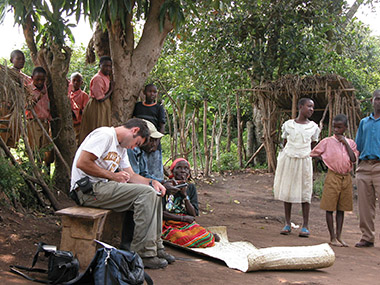 |
 |
| current issue |  |
past issues |  |
send a letter/news |  |
address update |  |
advertise |  |
about us |  |
alumni home |
A UNH geographer helps give a voice to Ugandans living To baboons and elephants, Kibale National Park looks like a slice of East African paradise: 300 square miles of food, shelter and room to roam, with no one to bother them except tourists snapping photos. To scientists and policy makers, Kibale looks like a conservation success story: a lush tropical forest that preserves prime habitats and endangered species while reshaping visitors' image of Uganda. To the residents just outside the park's borders, Kibale looks like something else entirely: a locked storehouse of resources they need but cannot touch. The park boundaries that keep them out mean nothing to the baboons and elephants that cross freely to dig up and trample their crops. Nearly a decade into his research in Uganda, Joel Hartter understands that all three perspectives are valid. Hartter, an assistant professor of geography, has come to believe that no conservation effort, in Africa or elsewhere, can be judged a success unless it takes into account the needs of local residents. Hartter loves the land and the wildlife of the Albertine Rift, a jagged north-south gorge whose mountains and valleys extend 900 miles through five African countries. But most of all he cares about the people of the Kibale region of western Uganda. In the din of debate over climate change and conservation, he hopes that what he and his colleagues are learning there will give these villagers a voice. "A lot of science talks about big global issues, but really when it comes down to it, science and policy are applied at very local levels," Hartter says. "The local people are the ones who make conservation work. We want to help policy makers, land managers and conservation advocates understand that it's not just about conserving biological diversity—the primates and big animals—but about balancing biodiversity with people's livelihoods."
Each day, the people along Kibale's borders live that balancing act. Because they have no electricity and need wood for cooking, they've cut down most of the trees outside the boundaries of the park, from which all residents were evicted 20 years ago. They can't go into the park to cut wood or graze livestock. The corn and other crops they grow are their main source of food and income; when baboons and elephants from the park raid the fields, the people have nothing to fall back on. "During harvest time, they pull their kids out of school two to four days a week, to guard the crops," Hartter says. But baboons are so intelligent that they've learned not to be afraid. "So the kids are not getting an education, and they're at risk of diseases and parasites from coming into contact with the animals." Animals are the Albertine Rift's showpiece. Kibale National Park alone is home to 375 species of birds and 70 species of mammals, including nearly 1,500 endangered chimpanzees (video) and a dozen other species of primates—with melodious names like red colobus, grey-cheeked mangabey and bush baby—that draw scientists and tourists from around the world. Ever since Hartter began traveling to Africa, animals have provided a constant source of amazement and adventure. Sometimes chimpanzees casually walk along beside him as he goes about his work in Kibale. In other parts of the region he has glanced into a tree and met the gaze of a yawning lion. Once, camping along the Congo-Uganda border, he inadvertently pitched his tent over a succulent section of grass and was nudged awake by ravenous hippos rooting under his sleeping bag. Hartter knew that his research would involve studying the interrelationships among animals, land and people. What he didn't realize was that he'd be building his own relationships, and how much those would come to mean to him. "Here are these people who, compared to what we have in material things, have nothing," he says. "But in so many ways they are so incredibly happy, so incredibly blessed, with this genuine sense of love and support and hospitality. Anybody who goes there and doesn't want to help—I just don't know how that's possible." |
blog comments powered by Disqus



